Georgia Is an Adventure Paradise Where Hiking Meets Khachapuri
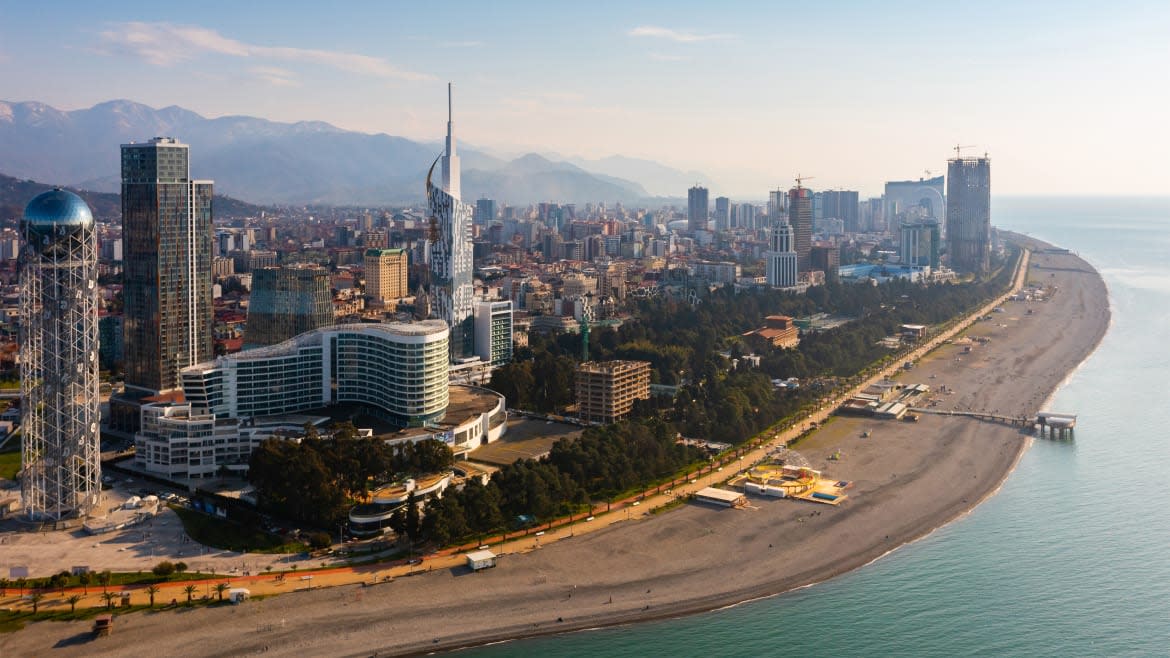
Where are the Caucasian snowcocks? For two hours, we’d been hunched over our telescopes, teeth chattering like jackhammers on the snowy slopes of the Greater Caucasus as we waited for the elusive gray gamebird to make an appearance. Awake since 4 a.m., our patience was wearing thin. “Chacha break!” shouted our guide, Dachi Shoshitashvili, whipping out an old water bottle filled with 140-proof Georgian moonshine.
Gut-warming shots before sunrise, an entire mountain to yourself, a bird guide who knows the Caucasus wilderness like his backyard (yet isn’t the least bit pedantic about it)—these are a few of the many perks of adventure travel in Georgia, which encompasses skiing, canyoning, parasailing, fly-fishing, RVing in refurbished Soviet vans, and much, much more… And we haven’t even talked about the prices yet.
For nearly a decade I’ve been visiting Georgia to report on everything from ancient winemaking traditions to blood-curdling ghost towns to the last truly wild place in Europe. But nothing prepared me for what I found when I started researching Georgian adventure travel: Here was a place where you could be jet-skiing in the Black Sea one day and heli-skiing down glaciated peaks the next—all in a country roughly the size of South Carolina. Georgia is one of Europe’s most intriguing outdoor destinations, and nobody seems to be talking about it.
But the thing about planning an outdoor adventure to Georgia—instead of one focused on, say, wine tasting or monastery hopping—is that seasonality is key. Many areas are snowbound and inaccessible for over half of the year, while others, like the watersport Eden of Batumi, are bleak and humdrum in the off season. Knowing when to go is half the story.
Spring: Rafting, Biking, and Canyoning
Over the last month, I’ve been watching the waterfall outside my window in Tbilisi go from trickle to torrent, splashing unsuspecting tourists with ice-cold water. This time of year, snowmelt from the high Caucasus sends water rushing down rocky rivulets into the lowlands—making for terrific kayaking and whitewater rafting. I learned this firsthand at Jomadia Rafting Camp in south central Georgia, where you can show up, no booking required, and within minutes be tumbling down rapids on a six-person boat with a guide at the helm. (Bonus: The camp is situated on the way to the fairytale cave city of Vardzia.) The experience was thrilling enough to get my adrenaline pumping but still felt totally safe, even though I was a newbie.
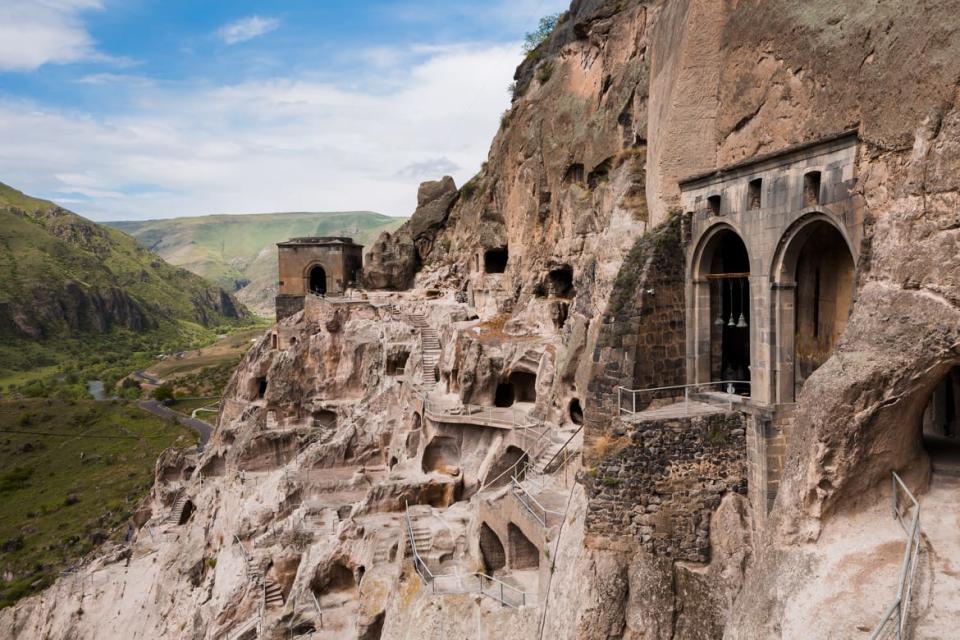
Vardzia cave monastery site in southern Georgia.
Now that I’ve cut my teeth, next spring I’ll be seeking out faster, steeper rapids. By all accounts, adventure guide Mamuka Burduli is the guy to call—he’s known for intrepid excursions down the Rioni River (near the western city of Kutaisi, which has its own airport).
But there are plenty of rafting options closer to Tbilisi, too. Friends I trust clued me in on two solid (if somewhat slower and more meandering) excursions an hour’s drive north from the capital: Rafting Camp and Aragvi Rafting, both located near the khinkali mecca of Pasanauri. It’s hard to beat ending a day on the river with hand-pleated soup dumplings and cold Georgian beer overlooking the Aragvi.
Jomadia (where I braved my first rapids) sits at the edge of the Borjomi Nature Reserve, a 4,019-square-mile park known for its therapeutic springs and leafy rolling mountains veined with paths ideally suited to mountain biking. The fan favorite is the No. 6 Footprint Trail, which starts in Likani village and climbs some 2,600 feet to a panoramic viewpoint. Before venturing up into the mountains (Georiders will get you sorted) to ride past glaciers in Kazbegi on the Russian border, to take in one of Europe’s oldest settlements in Svaneti in the country’s northwest, or otherwise, consider starting with a dry run in the hills above Tbilisi. A number of easy trails offer splendid views over the city’s conical-domed churches and Soviet-era apartment blocks.
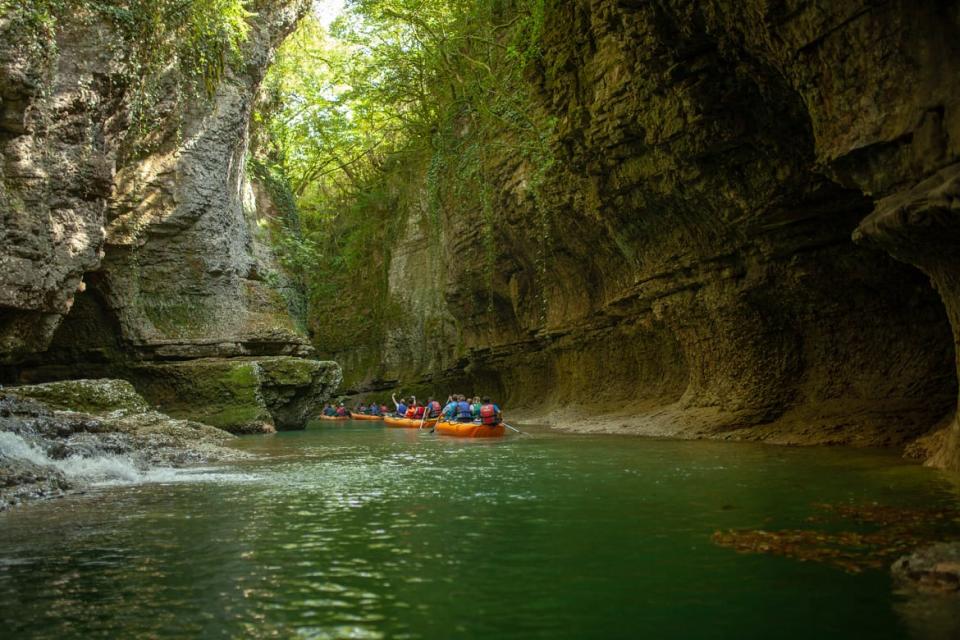
People rafting through a canyon in Martvili, Georgia.
Georgia’s Caucasus mountains have also been drawing an ever-growing number of canyoning enthusiasts, who call on CIC-certified guides like Giorgi Enukidze of Georgian Canyoning to rappel down fast-flowing streams and waterfalls in the bowels of valleys in northwestern Georgia like Tkhopra, Dzmuisi, and Sopo. And unlike similar canyons in the U.S. and Europe, in Georgia you seldom cross paths with other hikers and canyoneers.
Summer: Fly Fishing, RVing, Water Sports, Trekking
Fly fishing hasn’t caught on in Georgia—yet—despite the country being a prime destination for the sport: Crystal-clear rivers abound, and many are teeming with feisty brown trout. Shota Jokhadze (info@flyfishing.ge), the country’s top guide for recreational angling, is a walking GPS. He knows all the best fishing holes, which come alive especially in summer when the trout are at their most voracious. Multiday adventures with Shota into the protected nature area of Tusheti will have you camping in the Caucasian wilderness and cooking over live fire, though shorter trips (rods, waders, and gear included) are bookable, too.
But I have to be honest—I think I’ve been too corrupted by city life to enjoy standing and casting in the stillness of nature for long stretches of time. To me, a more appealing way to explore Georgia’s remote reaches is by RV. Enter Overlando, a tour company that stands out for its fleet of old-school Buhanka campervans refitted with 4G WiFi hotspots, JBL speakers, and all the cookware and bedding you need for a comfortable escape. Beyond the Buhanka’s Insta-chic Soviet kitschiness, the van is also practical for Georgia’s bumpy back roads, thanks to its high clearance, four-wheel drive, and narrow silhouette. (An aside: If I were a kid, I’d kill to sleep in the attachable rooftop tent, which ups the van’s capacity to four.)
RVing is best in summer, when you’re less likely to get rained on or stuck in the mud. But Georgia has lots going on for those who actually want to get wet. In the subtropical Black Sea city of Batumi, near the Turkish border, it’s impossible to walk down the four-mile-long boardwalk without getting accosted by buff dudes renting water scooters, wakeboards, paddle boards, and parasailing excursions—all great ways to take in sweeping views of the port’s rock beaches and flamboyant, Vegas-like skyline.
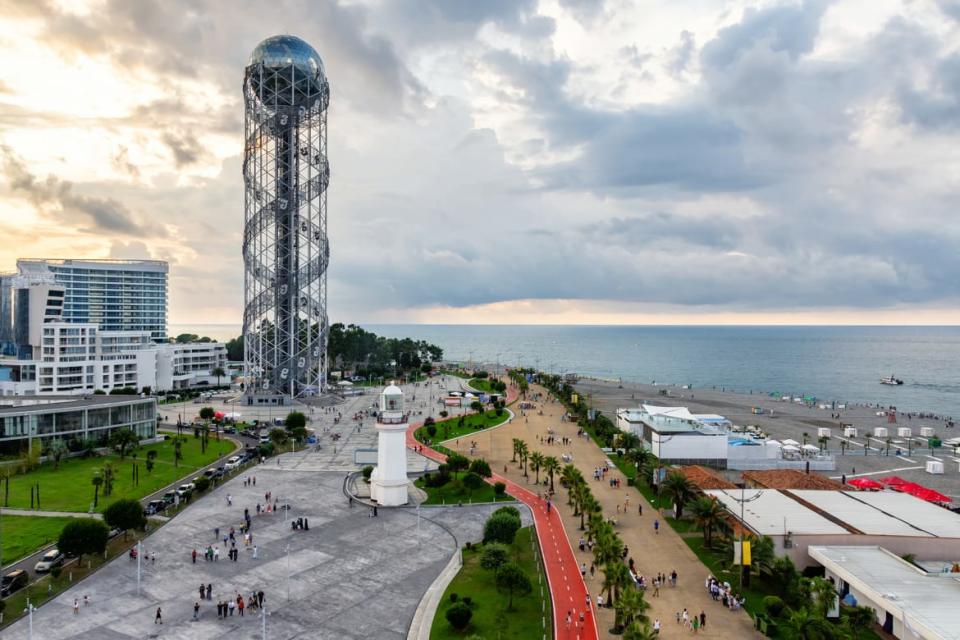
The beach boardwalk in Batumi along the Black Sea coast.
Yet of all Georgia’s outdoor attractions, the most popular is trekking. After all, the country is home to four of Europe’s eight highest mountains. Three of those (Ushba, Tetnuldi, and Shkhara) are found in the northwestern region of Svaneti, known for one of the world’s most scenic hikes, from Mestia to Ushguli. The four-day, 36-mile route winds between turquoise lakes and lost-in-time villages and ends at a UNESCO-protected medieval enclave believed to be the highest continuously inhabited settlement in Europe. Happily there’s no need to pack a tent—the move here is to crash is at rustic guest houses where you’ll refuel nightly with hearty local dishes like kubdari (meat-filled flatbread redolent of fenugreek and mountain thyme) and chvishtari (cheesy fried corn cakes). Svaneti is buried under snow in winter and muddy in the spring, so summer (or early autumn) is the optimal time to visit.
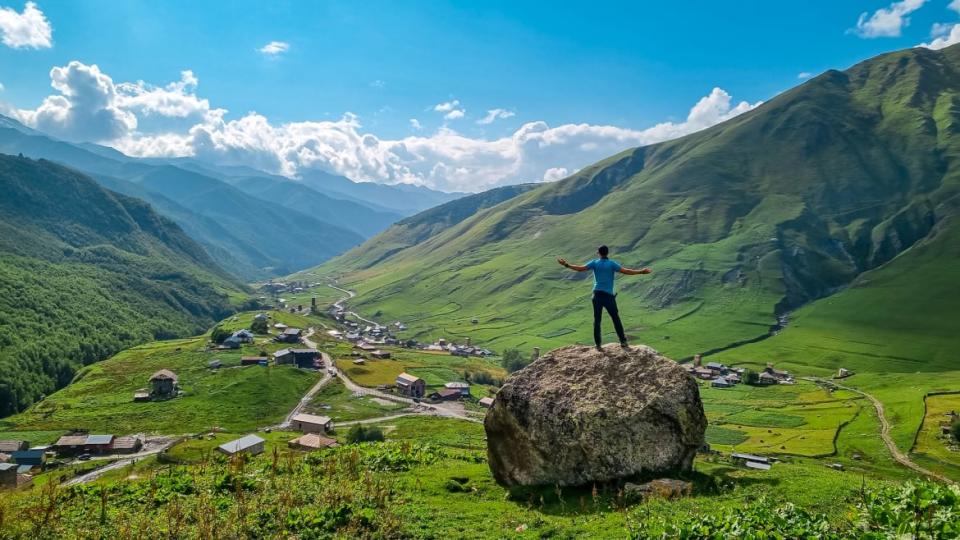
Hiking above the village Ushguli, near the Shkhara Glacier in the Greater Caucasus Mountains in the Svaneti Region of Georgia.
Fall: Bird Watching, Horseback Riding, Winemaking
Every fall, Georgia plays host to one of nature’s most awe-inspiring spectacles: the autumn bird migration from Europe to Africa. Millions of birds—storks, raptors, flamingos, warblers, swallows, flycatchers, and more—make a temporary home in the Caucasus from (roughly) August to October as they move to warmer climes in search of food and safe breeding grounds. And yet, not only is the bird-watching community in Georgia relatively small; all but the most avid switchers are unaware of the country’s avian riches.
On a mission to change that is Dachi (dachi.shoshitashvili.1@iliauni.edu.ge), the snowcock whisperer we met earlier whom you could call Georgia’s premier bird nerd. Dachi spends most of the year on the road leading small groups of hardcore birders, helping them complete their life lists with Georgia’s “Big Five”: Caucasian grouse, great rosefinch, white-winged redstart, mountain chiffchaff, and—yes—those vexingly coy Caucasian snowcocks. Beyond the holy-grail species, there are more than 400 types of birds you can spot in Georgia, and spring is primetime. “This time of year, you can spot up to 200 different species on a single trip,” Dachi told me, adding that visiting bird lovers can help local conservation efforts by monitoring birds with Batumi Raptor Count, an indispensable nonprofit.
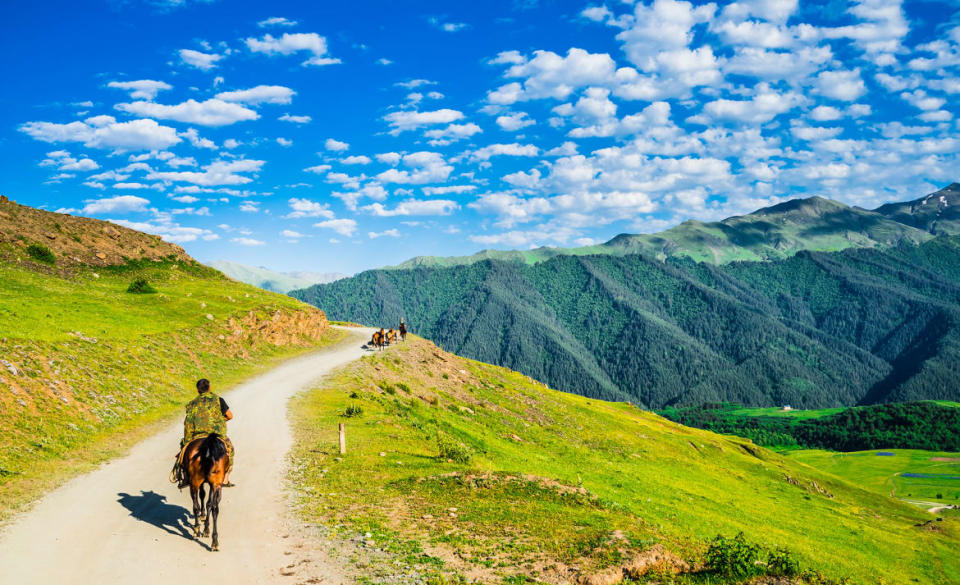
Horse trekking in the mountains of Tusheti, Georgia.
But birds aren’t the only animals migrating in Georgia come autumn: October also marks the annual transhumance of horses in Tusheti. Tusheti is a protected nature reserve and one of the remotest corners of Europe—it takes several hours of off-road driving to get there, a journey the BBC once called one of the most dangerous in the world. But those who visit are rewarded with stuck-in-time stone villages inhabited by rugged, welcoming locals who practice pagan-influenced Christianity and speak an ancient dialect of Georgian.
Horses remain the main form of transportation in Tusheti, but like most of the region’s inhabitants, the horses have to get out of Dodge before heavy snow and near isolation make Tusheti all but unlivable. That’s where Tinatin Ididze comes in. A Tusheti native, Tinatin each year embarks on an epic equestrian adventure that moves the horses down from the high mountain pastures of Tusheti to the scrubby grasslands of Vashlovani, near the Azerbaijan border, where the horses roam freely until the following spring. Intrepid horse riders, listen close: Tinatin takes a handful of tourists along for what I can only imagine is the ride of a lifetime. (Those less inclined to rough it can also hire Tinatin, who is certified in equestrian tourism, for all sorts of horseback riding itineraries.)
While Tinatin is busy rounding up the horses in the highlands, Georgians elsewhere are consumed by one of the country’s most coveted celebrations: rtveli, the annual grape harvest. Georgia lays claim to the world’s oldest winemaking tradition, dating back to 5900 B.C., some 2,500 years before the invention of the wheel. But it’s not all chichi swirling and sipping in Georgian wine country—you can actually pick and stomp grapes here. With a bit of advance notice, wineries like Andronikashvilis Marani (levan@marani.organic) and Nikalas Marani will let you pick and press ancient Georgian grapes you’ve probably never heard of such as rkatsiteli, kisi, and saperavi. And after a hard day’s work, you’ll sit down to a wine-soaked supra (Georgian feast) fit for the gods.
Winter: Skiing and Snowboarding
At Zermatt in Switzerland, a one-day ski pass costs around $100. At Gudauri, Georgia’s most popular ski resort, that ticket will set you back a mere $27. The math doesn’t lie—even when you account for the difference in airfare, Georgia beats the Alps almost every time when it comes to affordable ski vacations. And I don’t know about your après-ski preferences, but I’ll take gooey khachapuri, lavash-swaddled kebabs, and slurpable soup dumplings any day over potatoes and fondue.
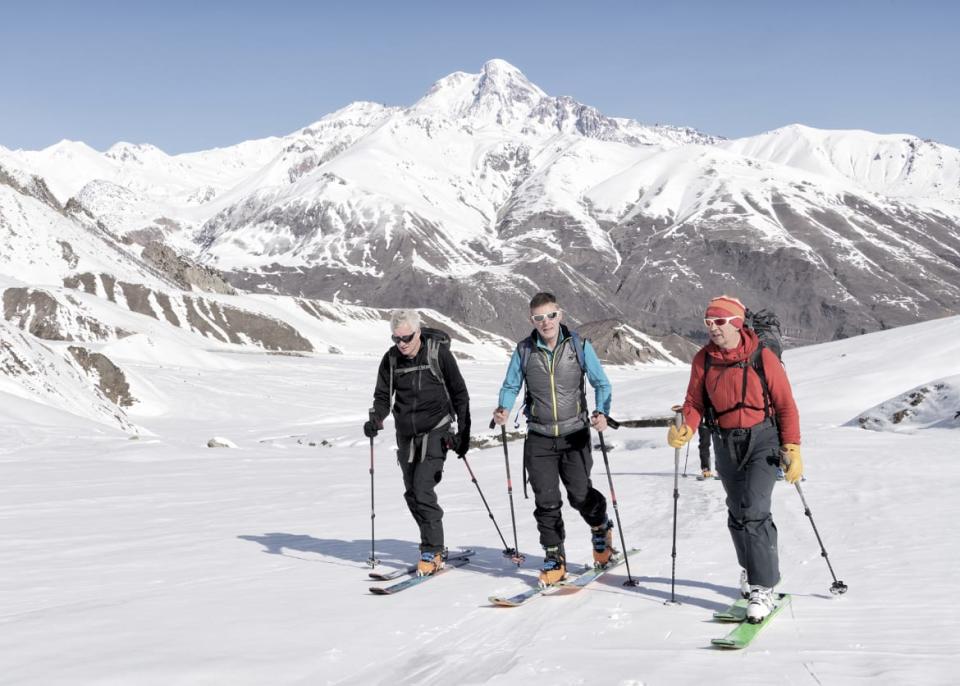
People on a ski tour in Gudauri, Georgia.
Just two hours from Tbilisi by car, Gudauri—a mountain resort high above the treeline with a number of ski-in-ski-out hotels—is Georgia’s most universally appealing ski resort. Why? It boasts 44 miles of pistes, English-speaking ski instructors, and a new cable car connecting it all to the town of Stepantsminda (known for the staggeringly gorgeous Gergeti Church and the luxurious hideaway of Rooms Kazbegi). When I visited a couple years ago, I wound up kicking back chacha shots and dancing to reggaeton with some Germans I met in the cafeteria. There’s nothing pretentious or exclusive about Gudauri—and that’s precisely why it’s my favorite ski resort.
But for adrenaline-loving skiers and boarders who slalom down black diamonds without a hitch, there may be no more spirit-freeing bucket-list experience than a day spent heliskiing. It’s exactly what it sounds like: A helicopter whisks you up to an unspoiled, un-skied mountaintop in an alpine no man’s land, then (alongside a certified guide) you ski down perfect powder to the base of the mountain, where you do it all again. If you’re thinking, “I’m definitely not rich enough for this,” consider that in Georgia, heliski runs start at $220 per person (a six-run package costs $820). According to the Georgia National Tourism Administration, the safest, most experienced heliski company is Heliski Georgia.
Get the Daily Beast's biggest scoops and scandals delivered right to your inbox. Sign up now.
Stay informed and gain unlimited access to the Daily Beast's unmatched reporting. Subscribe now.

